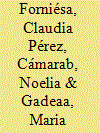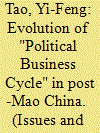| Srl | Item |
| 1 |
ID:
128835


|
|
|
|
|
| Publication |
2014.
|
| Summary/Abstract |
The propensity of cutting some government spending during the crisis time generates the incentive for some policy-makers and governments to modify certain expenses irrespective to output variations. The goal of this paper is to analyse the cyclical properties of defence expenditure in Spain (1978-2009) and to characterize the consequences of economic and political cycles on this public spending.
|
|
|
|
|
|
|
|
|
|
|
|
|
|
|
|
| 2 |
ID:
126732


|
|
|
|
|
| Publication |
2013.
|
| Summary/Abstract |
There is an issue which often emerges whenever nearing an election campaign - the fear of an 'election year economics' and the damage it brings. The fear is that the government will implement policies aimed at 'benefiting the people' in order to win re-election, such as increasing public expenditures, introducing tax cuts, raising salaries, etc. These actions, however, benefit the people only in the short term. Over the long run they may cause great damage as they force governments to borrow or print money, or to choose another route, of tax increases or government budget cuts, to be applied soon after the elections. Both options demonstrate how election economics can be seen as something akin to a 'bribe' given to voters, which damages not only the economy, but the entire political culture as well. Thus, it is interesting to examine whether there is an election economy in Israel. The article covers the three decades from 1982 to 2010. The findings show that during this period, the use of election economics in Israel decreased, and that in recent campaigns it seems to have completely disappeared.
|
|
|
|
|
|
|
|
|
|
|
|
|
|
|
|
| 3 |
ID:
072150


|
|
|
| 4 |
ID:
120794


|
|
|
|
|
| Publication |
2013.
|
| Summary/Abstract |
Elections are considered to be the political events that have the most influence on stock markets. The previous literature has examined three types of election effects: the election cycle effect, the bull-run election effect, and the party effect. This study investigates the international impact of United States presidential elections on the Taiwanese stock market. The findings indicate that the Taiwanese stock market is sensitive to the U.S.-China-Taiwan relationship.
|
|
|
|
|
|
|
|
|
|
|
|
|
|
|
|